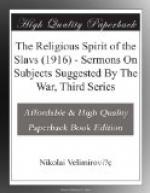Roman Catholicism in Spain came through its test very badly. Before the Islamic invasion, and after it for a long time, the Christian population showed itself inferior to the Moors, in work, in justice, in progress. But to the honour of Roman Catholicism I must say that it stood the test very well in Croatia and in Hungary in its struggle against Islam. German cathedral Protestantism failed in its test. It is destroyed as a religion, it exists only as an archival science. It ceased to be what Christianity really sought to be—a drama; it is transformed into an indifferent scientific medium for reading, exploring, classifying, comparing, criticising. It is no more a living, dramatic being—no more the serving, ruling and suffering Christ. There is very little heroic or divine in it!
Why not then worship Wothan again instead of Christ?
And Anglicanism? It had the worst enemy. That was wealth, comfort, quiet business, lack of big disturbances and of great sufferings. The English Church still succeeded in preventing all the misuses and abuses of life under such circumstances. This success can be appreciated only if the British Empire is compared with an antique Pagan Empire. Where in this Empire is there a Lucullus or a Caracalla? The astonishing luxury, the bestial, insatiable passions? Or the furious competitions in petty things with which the social life of Rome was daily intoxicated? Yet English Christianity is neither so dramatic and full of contrasts as Dante’s Catholicism, nor so vibrating a lyric as Dostojevsky’s Orthodoxy, but rather a quiet, smooth epic like Milton’s poetry.
THE GREAT DOGMA OF SIN AND SUFFERING.
The Anglican Church has formulated this dogma much in the same words as that of the Orthodox Church. Yet it is not nearly so vivid in the daily faith of the English people as in that of the Slavs. The friends of the reunion of the Anglican and Orthodox Churches never mention this difference, which is, I think, the only really great difference between them. This life on earth for the English Christian conscience is a normal one with some few objections. Given some correction, and life here on earth would be quite normal and perfect. Slav Orthodoxy, on the contrary, emphasises very emphatically the abnormality of human life on earth from the beginning. Sin is the beginning of life, and sins are the continuation of it. The first man deviated in some way from God’s will; the first brother killed his younger brother; the first-born nation made war with the second-born nation, and this bloody business of men, of which, in the greatest degree, we are the witnesses to-day, continued through many thousands of years. The development of human virtues is not so obvious as the development of human sins. Still, nobody has written a work on the development of sins. The Orthodox Church believes quite seriously in this fatal development; she believes more than seriously that




